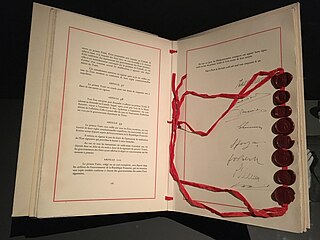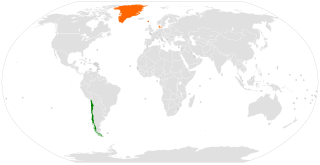Related Research Articles

The Treaty on the European Union (2007) is one of the primary Treaties of the European Union, alongside the Treaty on the Functioning of the European Union (TFEU). The TEU forms the basis of EU law, by setting out general principles of the EU's purpose, the governance of its central institutions, as well as the rules on external, foreign and security policy.

The Treaty of Paris was signed on 18 April 1951 between France, Italy, West Germany, Belgium, Luxembourg, and the Netherlands, establishing the European Coal and Steel Community (ECSC), which subsequently became part of the European Union. The treaty came into force on 23 July 1952 and expired on 23 July 2002, exactly fifty years after it came into effect.

The European Atomic Energy Community is an international organisation established by the Euratom Treaty on 25 March 1957 with the original purpose of creating a specialist market for nuclear power in Europe, by developing nuclear energy and distributing it to its member states while selling the surplus to non-member states. However, over the years its scope has been considerably increased to cover a large variety of areas associated with nuclear power and ionising radiation as diverse as safeguarding of nuclear materials, radiation protection and construction of the International Fusion Reactor ITER.

An entity to be named the European Political Community (EPC) was proposed in 1952 as a combination of the existing European Coal and Steel Community (ECSC) and the proposed European Defence Community (EDC). A draft EPC treaty, as drawn up by the ECSC assembly, would have seen a directly elected assembly, a senate appointed by national parliaments and a supranational executive accountable to the parliament.
The Treaty of al-Hudaybiya was an event that took place during the lifetime of the Islamic prophet Muhammad. It was a pivotal treaty between Muhammad, representing the state of Medina, and the tribe of the Quraysh in Mecca in March 628. The treaty helped to decrease tension between the two cities, affirmed peace for a period of 10 years, and authorised Muhammad's followers to return the following year in a peaceful pilgrimage, which was later known as the First Pilgrimage.
The Merger Treaty, also known as the Treaty of Brussels, was a European treaty which unified the executive institutions of the European Coal and Steel Community (ECSC), European Atomic Energy Community (Euratom) and the European Economic Community (EEC). The treaty was signed in Brussels on 8 April 1965 and came into force on 1 July 1967. It set out that the Commission of the European Communities should replace the High Authority of the ECSC, the Commission of the EEC and the Commission of Euratom, and that the Council of the European Communities should replace the Special Council of Ministers of the ECSC, the Council of the EEC and the Council of Euratom. Although each Community remained legally independent, they shared common institutions and were together known as the European Communities. This treaty is regarded by some as the real beginning of the modern European Union.
The Euratom Treaty, officially the Treaty establishing the European Atomic Energy Community, established the European Atomic Energy Community. It was signed on 25 March 1957 at the same time as the Treaty establishing the European Economic Community.
The Davignon report, also referred to as the Luxembourg report, published on 27 October 1970, was a report on the future foreign policy of European Economic Community member nations. It was written by a council chaired by Étienne Davignon of the Belgian Foreign Office. The committee was appointed by the Council of the European Communities to make proposals on political cooperation between the member states. It recommended that member states should try to speak with a single voice on international problems, a proposal that was approved by all six member governments. It resulted first in European Political Cooperation and later in the European Union's Common Foreign and Security Policy in 1992.
Sessai Chōrō (雪斎長老) or Imagawa Sessai, also known as Taigen Sessai (太原雪斎), was a Japanese abbot and mountain ascetic (yamabushi). He was an uncle of Imagawa Yoshimoto, and served him as military advisor and as commander of Imagawa's forces, despite his lack of any formal battle training or experience.
The Treaty of the Bogue was an unequal treaty between the United Kingdom and China, concluded in October 1843 to supplement the previous Treaty of Nanking. The treaty's key provisions granted extraterritoriality and most favored nation status to Britain.

The Treaty on the Functioning of the European Union (TFEU) is one of two treaties forming the constitutional basis of the European Union (EU), the other being the Treaty on European Union (TEU). It was previously known as the Treaty Establishing the European Community (TEC).

A Luxembourgish passport is an international travel document issued to nationals of the Grand Duchy of Luxembourg, and may also serve as proof of Luxembourgish citizenship. Besides enabling the bearer to travel internationally and serving as indication of Luxembourgish citizenship, the passport facilitates the process of securing assistance from Luxembourg consular officials abroad or other European Union member states in case a Luxembourg consular is absent, if needed.
The Treaty of Dunkirk was signed on 4 March 1947, between France and the United Kingdom in Dunkirk (France) as a Treaty of Alliance and Mutual Assistance against a possible German attack in the aftermath of World War II. It entered into force on 8 September 1947 and according with article VI paragraph 2 of its text it remained in force for a period of fifty years.

The Treaty of Stettin of 4 May 1653 settled a dispute between Brandenburg and Sweden, who both claimed succession in the Duchy of Pomerania after the extinction of the local House of Pomerania during the Thirty Years' War. Brandenburg's claims were based on the Treaty of Grimnitz (1529), while Sweden's claims were based on the Treaty of Stettin (1630). The parties had agreed on a partition of the Swedish-held duchy in the Peace of Westphalia (1648), and with the Treaty of Stettin determined the actual border between the partitions. Western Pomerania became Swedish Pomerania, Farther Pomerania became Brandenburgian Pomerania.
The Ottoman–Persian Wars or Ottoman–Iranian Wars were a series of wars between the Ottoman Empire and the Safavid, Afsharid, Zand, and Qajar dynasties of Iran through the 16th–19th centuries. The Ottomans consolidated their control of what is today Turkey in the 15th century, and gradually came into conflict with the emerging neighboring Iranian state, led by Ismail I of the Safavid dynasty. The two states were arch rivals, and were also divided by religious grounds, the Ottomans being staunchly Sunni and the Safavids being Shia. A series of military conflicts ensued for centuries during which the two empires competed for control over eastern Anatolia, the Caucasus, and Iraq.

Denmark–Italy relations are the current and historical relations between Denmark and Italy. Both countries have embassies in their respective capitals and both countries are members of the European Union and NATO.

Chile–Denmark relations refers to the current and historical relations between Chile and Denmark. Chile has an embassy in Copenhagen, and Denmark has an embassy in Santiago. Relations between the two countries are described as "friendly" and excellent.

The Western Union (WU), also referred to as the Brussels Treaty Organisation (BTO), was the European military alliance established between France, the United Kingdom (UK) and the three Benelux countries in September 1948 in order to implement the Treaty of Brussels signed in March the same year. Under this treaty the signatories, referred to as the five powers, agreed to collaborate in the defence field as well as in the political, economic and cultural fields.

Denmark–Sudan relations refers to the current and historical relations between Denmark and Sudan. Denmark is represented in Sudan, through its embassy in Addis Ababa, Ethiopia. Sudan is represented in Denmark, through its embassy in Oslo, Norway.
The North German Confederation Treaty was the treaty between the Kingdom of Prussia and other northern and central German states that initially created the North German Confederation, which was the forerunner to the German Empire. This treaty, and others that followed in September and October, are often described as the August treaties, although not all of them were concluded in August 1866.
References
- ↑ "Consolidated Treaty Series", in John P. Grant and J. Craig Barker (eds.), Encyclopaedic Dictionary of International Law, 3rd ed. (Oxford University press, 2009).